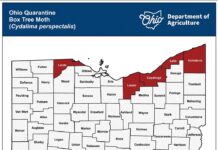PERRYSBURG, Ohio — Many farmers would say knowledge is the key to success, but the problem for many right now is finding the information needed to succeed under the proposed climate change legislation.
What if’s?
There are still so many unknowns that it may be hard for farmers to figure out the best strategy for their success using the program.
However, Bill Hohenstein, director, USDA Global Change Program Office, has authored a preliminary analysis of the effects of H.B. 2454 passed in June. The bill will set up a cap-and-trade system for carbon credits.
Overview
Under the bill as it stands now, every business will be told they have to cut emissions by significant amounts. Businesses that cannot cut any emissions will have to purchase carbon credits from a producer — either a company or a farmer — that has positive carbon credits to sell.
That’s where the role of the farmer will come in.
By using environmentally safe practices or improvements, they will be able to sell the carbon credits on the commodities markets, potentially generating income for their farms.
Cost increases
Hohenstein believes the cost of doing business in agriculture will increase due to the legislation, but he also believes the cost will be offset with the sale of carbon credits.
But that’s another information gap, as carbon credit price have not been set. Analysts are using estimates in studies to figure out how much it will impact a farm’s bottom line.
Hohenstein believes the cost of energy, fertilizer and lime could increase about 7 percent as a result of the bill.
Row crops
Hohenstein said agriculture is an energy-intensive sector, with row crop production being particularly affected by energy price increases.
This increase in row crop production costs could lead to higher feed costs, which in turn leads to a contraction in livestock and dairy production, and, as a result, higher prices for those products.
Livestock costs
Bill Knapke, of Cooper Farms, Fort Recovery, Ohio, said his organization can’t pass higher costs on to the consumer, meaning higher energy costs will have to be absorbed.
“If we don’t import crude oil, then we are going to be importing food in the future,” Knapke said.
Matt Roberts, agricultural economist at Ohio State University, said the legislation will definitely have variable cost effects on farms.
Significant legislation
Roberts also called the proposed legislation the most economically significant legislation since income tax legislation.
He explained another portion of the equation is how the market participants will respond to the cap-and-trade program.
Roberts agreed the cost effects of the legislation will be felt on fuel, fertilizer and energy use, and it should range between 5 and 15 percent. Increased cost will also be felt in other areas of the farm, such as steel or concrete used to expand or create a building on the property.
On the flip side, Roberts’ research shows an increased demand for biofuels and biomaterials could benefit farmers.
Too many questions
But like everyone else, Roberts agrees there are many questions to be answered, including who owns the carbon credits, the farmers or landowners; are CAFOs agriculture or will they be deemed industry; and how will the bill be enforced?
Local producer
Fred Yoder, an Ohio corn producer and member of the Ohio Corn Growers Association, said he is a big believer in the marketplace and how it works.
“The market will sort this out,” Yoder said.
He has traveled to Brazil with the Ohio Corn Growers Association to learn about the impacts of indirect land use and to examine their agriculture habits. He has also been involved with the National Corn Growers Association.
Yoder said farmers have to understand there will be an economic impact as a result of a climate change bill, but everyone has to work to get past it.










